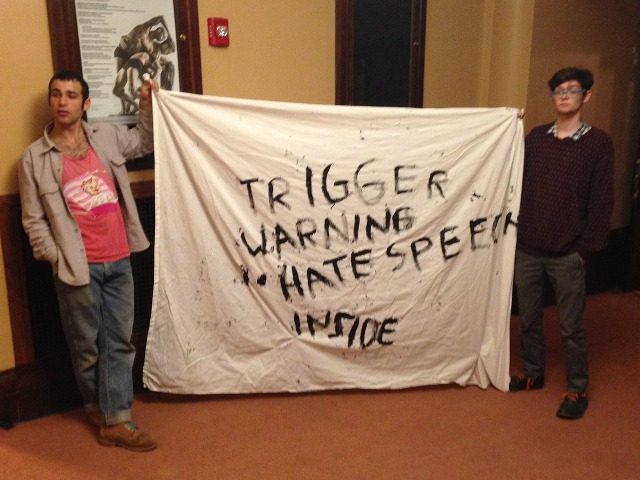A YouGov poll commissioned by the Cato Institute shows that most Americans feel the need to self-censor at the same time that many Americans feel the moral obligation to censor.
Might the former follow from the latter?
Disproportionately, the Americans feeling it necessary to self-censor identify as Republicans and the Americans feeling it necessary to censor identify as Democrats.
Again, might the former follow from the latter?
More Democrats than Republicans agreed that speakers should be censored on campus in every scenario (“Says Transgender People Have Mental Disorder,” “Says All Christians Are Backward & Brainwashed,” “Says Men on Average Are Better at Math Than Women,” etc.) presented by the pollsters. In all but one instance (“Publicly Criticizes & Disrespects the Police”) in which 49 percent of Democrats agreed, a majority of respondents identifying with that party called to muzzle the speakers seeking to air unfashionable views. In all but one situation (“Advocates for Violent Protest”), a minority of Republicans agreed with silencing speakers.
It didn’t matter whether the view described found more in common with the outlook of Democrats or Republicans. In every instance, a greater percentage of Democrats than Republicans called for muting speakers.
One sees the same mentality at work regarding terminations in the workplace. In six separate scenarios (“Believe Men Are Better at Math Than Women,” “Believe All White People Are Racist,” “Believe Psychological Differences Explain Why There Are More Male Engineers,” etc.), Democrats called for firing the worker holding a controversial view more than Republicans did.
Given that large percentages of the members of one of the two major parties regard it as morally advisable to fire people who do not believe as they do and do not recognize freedom of speech for people voicing ideas with which they disagree, the fact that members of the opposing party regard it as an adaptive strategy to self-sensor perhaps surprises few.
More than half of Democrats report no need to self-censor. In contrast, nearly three-fourths of Republicans and three-fifths of independents say they find it necessary to self-censor.
The more liberal the respondent the more likely the respondent reported feeling comfortable sharing views. The more conservative the respondent the more likely the respondent reported feeling uncomfortable sharing views.
The same people who wish to fire and silence those who disagree with them also, perhaps unsurprisingly, do not wish to become their friends. More than three in five Hillary Clinton voters described it as hard to be friends with a Trump voter. More than three-fifths of Trump voters described it as not hard to be friends with a Clinton voter.
The American public’s takeaway in the era of safe spaces, microagressions, and trigger warnings?
Be careful of what you say, how you think, and who you vote for. You may find yourself fired, muzzled, and unfriended.

COMMENTS
Please let us know if you're having issues with commenting.